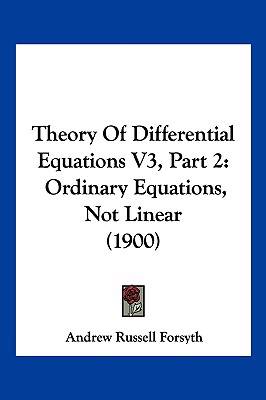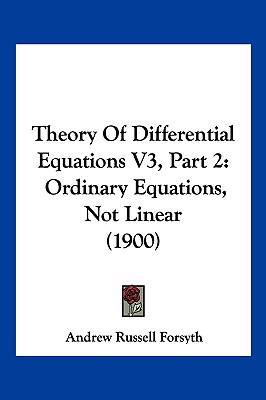
- Afhalen na 1 uur in een winkel met voorraad
- Gratis thuislevering in België vanaf € 30
- Ruim aanbod met 7 miljoen producten
- Afhalen na 1 uur in een winkel met voorraad
- Gratis thuislevering in België vanaf € 30
- Ruim aanbod met 7 miljoen producten
Zoeken
Theory Of Differential Equations V3, Part 2
Ordinary Equations, Not Linear (1900)
Andrew Russell Forsyth
Paperback | Engels
€ 50,45
+ 100 punten
Omschrijving
Theory of Differential Equations V3, Part 2: Ordinary Equations, Not Linear (1900) is a mathematical text written by Andrew Russell Forsyth. This book is the third volume of a series that focuses on the theory of differential equations. Part 2 of this volume delves into the study of ordinary equations that are not linear. The book is divided into several chapters, each of which covers a specific topic related to differential equations. The first chapter provides an introduction to the subject matter, including a brief overview of the history of differential equations and their applications. The subsequent chapters cover topics such as the existence and uniqueness of solutions, the reduction of higher-order equations to first-order systems, and the study of singular points and asymptotic behavior. Forsyth's writing style is clear and concise, making the book accessible to advanced students and researchers in the field of mathematics. The book includes numerous examples and exercises to help readers develop their understanding of the subject matter. Overall, Theory of Differential Equations V3, Part 2: Ordinary Equations, Not Linear (1900) is a valuable resource for anyone interested in the theory of differential equations, particularly those working with ordinary equations that are not linear.This scarce antiquarian book is a facsimile reprint of the old original and may contain some imperfections such as library marks and notations. Because we believe this work is culturally important, we have made it available as part of our commitment for protecting, preserving, and promoting the world's literature in affordable, high quality, modern editions, that are true to their original work.
Specificaties
Betrokkenen
- Auteur(s):
- Uitgeverij:
Inhoud
- Aantal bladzijden:
- 402
- Taal:
- Engels
Eigenschappen
- Productcode (EAN):
- 9781160714730
- Verschijningsdatum:
- 19/03/2010
- Uitvoering:
- Paperback
- Formaat:
- Trade paperback (VS)
- Afmetingen:
- 152 mm x 229 mm
- Gewicht:
- 535 g

Alleen bij Standaard Boekhandel
+ 100 punten op je klantenkaart van Standaard Boekhandel
Beoordelingen
We publiceren alleen reviews die voldoen aan de voorwaarden voor reviews. Bekijk onze voorwaarden voor reviews.











